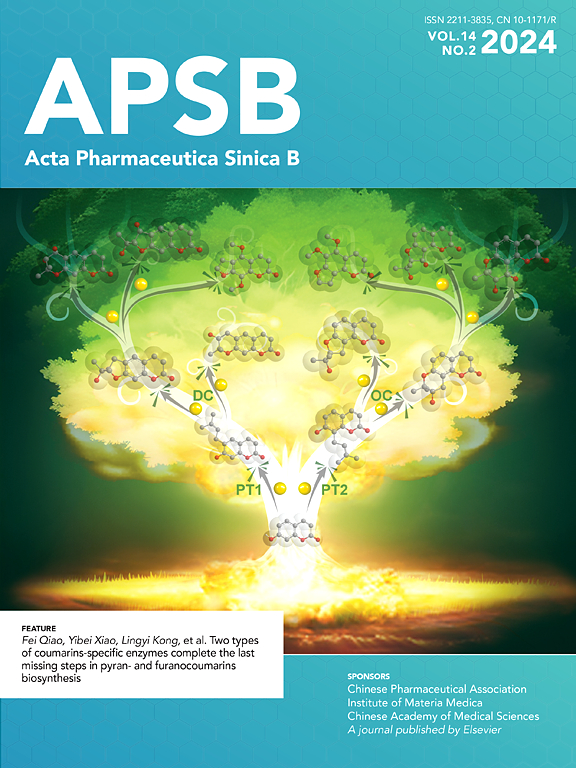CDK1-mediated phosphorylation of USP37 regulates SND1 stability and promotes oncogenesis in colorectal cancer
IF 14.7
1区 医学
Q1 PHARMACOLOGY & PHARMACY
引用次数: 0
Abstract
Colorectal cancer (CRC) poses a severe global health challenge with high incidence and mortality rates. USP37 has been identified as the bona fide deubiquitinase of SND1, playing a critical role in stabilizing SND1, thereby augmenting its oncogenic potential. The interaction between USP37 and SND1 was confirmed through extensive proteomics, ubiquitinomics, and interactomics, underscoring their synergistic effects on CRC proliferation and metastasis. Additionally, CDK1 has emerged as a pivotal regulator of USP37, phosphorylating it at threonine 631 rather than serine 628, enhancing its deubiquitinase activity, and consequently stabilizing SND1 to drive CRC malignancy further. Histological analyses of human CRC samples linked the upregulation of CDK1 and USP37 with increased SND1 levels and poor patient prognosis. High-throughput virtual screening and subsequent experimental validation identified Dacarbazine as a pharmacological inhibitor of USP37, and its inhibition disrupted SND1 stability, hindering CRC cell proliferation and metastasis. This study reveals a novel and promising molecular mechanism driving CRC progression through the CDK1–USP37–SND1 axis, highlighting the clinical importance of targeting this pathway to improve patient outcomes.

cdk1介导的USP37磷酸化调节SND1稳定性并促进结直肠癌的肿瘤发生
结直肠癌(CRC)是一个严重的全球健康挑战,其发病率和死亡率都很高。USP37已被确定为SND1真正的去泛素酶,在稳定SND1中发挥关键作用,从而增加其致癌潜力。通过广泛的蛋白质组学、泛素组学和相互作用组学证实了USP37和SND1之间的相互作用,强调了它们在结直肠癌增殖和转移中的协同作用。此外,CDK1已成为USP37的关键调节因子,在苏氨酸631位点而不是丝氨酸628位点磷酸化USP37,增强其去泛素酶活性,从而稳定SND1,进一步驱动CRC恶性肿瘤。人类结直肠癌样本的组织学分析将CDK1和USP37的上调与SND1水平升高和患者预后不良联系起来。高通量虚拟筛选和随后的实验验证证实,达卡巴嗪是USP37的药理学抑制剂,其抑制作用破坏了SND1的稳定性,阻碍了CRC细胞的增殖和转移。该研究揭示了一种通过CDK1-USP37-SND1轴驱动结直肠癌进展的新颖且有前景的分子机制,强调了靶向该途径以改善患者预后的临床重要性。
本文章由计算机程序翻译,如有差异,请以英文原文为准。
求助全文
约1分钟内获得全文
求助全文
来源期刊

Acta Pharmaceutica Sinica. B
Pharmacology, Toxicology and Pharmaceutics-General Pharmacology, Toxicology and Pharmaceutics
CiteScore
22.40
自引率
5.50%
发文量
1051
审稿时长
19 weeks
期刊介绍:
The Journal of the Institute of Materia Medica, Chinese Academy of Medical Sciences, and the Chinese Pharmaceutical Association oversees the peer review process for Acta Pharmaceutica Sinica. B (APSB).
Published monthly in English, APSB is dedicated to disseminating significant original research articles, rapid communications, and high-quality reviews that highlight recent advances across various pharmaceutical sciences domains. These encompass pharmacology, pharmaceutics, medicinal chemistry, natural products, pharmacognosy, pharmaceutical analysis, and pharmacokinetics.
A part of the Acta Pharmaceutica Sinica series, established in 1953 and indexed in prominent databases like Chemical Abstracts, Index Medicus, SciFinder Scholar, Biological Abstracts, International Pharmaceutical Abstracts, Cambridge Scientific Abstracts, and Current Bibliography on Science and Technology, APSB is sponsored by the Institute of Materia Medica, Chinese Academy of Medical Sciences, and the Chinese Pharmaceutical Association. Its production and hosting are facilitated by Elsevier B.V. This collaborative effort ensures APSB's commitment to delivering valuable contributions to the pharmaceutical sciences community.
 求助内容:
求助内容: 应助结果提醒方式:
应助结果提醒方式:


